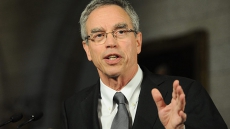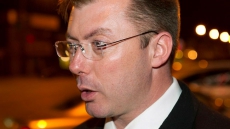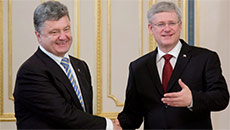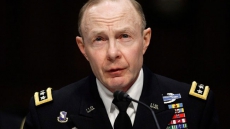Northern Iraq's Kurdish government used a visit by Foreign Affairs Minister John Baird to make an urgent plea for heavy weapons to fight the rampaging terrorist insurgency in the country.
"We need more weapons ... It will be a long fight," Faud Hussein, the chief of staff to the president of the Kurdish Regional government, said Thursday as he shared a podium with Baird for a final press conference in Irbil, the northern Iraqi capital.
"We are fighting a terrorist state that has roots in various countries."
He said many ISIL fighters come from other countries, including Canada.
Kurdish fighters need tanks, helicopters and artillery, he said.
Hussein and Baird met the media after the minister got a first-hand glimpse of the desolate theatre of battle in this arid, hot country.
Baird visited a front-line combat post in northern Iraq to start his second day in the war-torn country.
He and two opposition MPs got to within about a kilometre of about 150 fighters from the Islamic State of Iraq and the Levant, or ISIL, the al-Qaida splinter group waging a relentless offensive across this region.
The minister climbed to the bunker position, surveyed the landscape, and was briefed by Rowsch Nouri Sharways, the Iraqi deputy prime minister.
Baird described the visit to the fortified Kurdish Peshmerga position as an eye-opener, saying that being so close "puts it in perspective, for sure."
"It's not just an abstract problem taking place in a distant land, it's right in front of your eyes," he said.
"The horrifying thought is to see all these tents that came with all the families that were forced to leave their home, the horrific circumstances to have to be here."
Standing next to Hussein later at the press conference, Baird made no commitment to supply weapons.
He reiterated the nature of the Canadian commitments already made in Iraq on his visit, which include two military transport planes and almost $30 million in humanitarian assistance.
He said his purpose was to encourage the development of a strong, new, inclusive central government in Baghdad.
He said Canada and its allies currently meeting at NATO would be discussing a co-ordinated military response to the ISIL crisis.
At the request of Iraq and the U.S., Canada has joined France, Italy, Britain and Australia in helping fly in guns, mortars and ammunition to Iraqi forces — but is not supplying any weapons.
Baird also announced another $7 million in humanitarian assistance for relief supplies, emergency shelter and health care for thousands of civilians displaced by the fighting in northern Iraq.
Baird also issued a statement praising the bravery of the Kurdish fighters he visited.
"By offering safe haven to over 850,000 displaced persons internally and by engaging in direct combat with ISIL forces, the Kurdish people have shown the world their strength and their commitment to pluralism and peace," said Baird. "Canada stands by the security forces in Iraq, including the Kurdish Peshmerga forces, in achieving this goal."
He also met the bishop of Chaldean Catholic Church and other clergy in the regional capital of Irbil, as well as making a stop at the palace to meet the Kurdish president.
The minister also toured refugee camps and had conversations with numerous displaced people.




